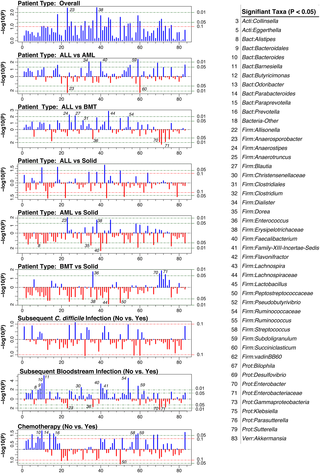Our official English website, www.x-mol.net, welcomes your
feedback! (Note: you will need to create a separate account there.)
Evaluation of bloodstream infections, Clostridium difficile infections, and gut microbiota in pediatric oncology patients.
PLOS ONE ( IF 2.9 ) Pub Date : 2018-01-12 , DOI: 10.1371/journal.pone.0191232 Bryan T Nycz 1 , Samuel R Dominguez 2 , Deborah Friedman 3 , Joanne M Hilden 4 , Diana Ir 1 , Charles E Robertson 1 , Daniel N Frank 1
PLOS ONE ( IF 2.9 ) Pub Date : 2018-01-12 , DOI: 10.1371/journal.pone.0191232 Bryan T Nycz 1 , Samuel R Dominguez 2 , Deborah Friedman 3 , Joanne M Hilden 4 , Diana Ir 1 , Charles E Robertson 1 , Daniel N Frank 1
Affiliation

|
Bloodstream infections (BSI) and Clostridium difficile infections (CDI) in pediatric oncology/hematology/bone marrow transplant (BMT) populations are associated with significant morbidity and mortality. The objective of this study was to explore possible associations between altered microbiome composition and the occurrence of BSI and CDI in a cohort of pediatric oncology patients. Stool samples were collected from all patients admitted to the pediatric oncology floor from Oct.-Dec. 2012. Bacterial profiles from patient stools were determined by bacterial 16S rRNA gene profiling. Differences in overall microbiome composition were assessed by a permutation-based multivariate analysis of variance test, while differences in the relative abundances of specific taxa were assessed by Kruskal-Wallis tests. At admission, 9 of 42 patients (21%) were colonized with C. difficile, while 6 of 42 (14%) subsequently developed a CDI. Furthermore, 3 patients (7%) previously had a BSI and 6 patients (14%) subsequently developed a BSI. Differences in overall microbiome composition were significantly associated with disease type (p = 0.0086), chemotherapy treatment (p = 0.018), BSI following admission from any cause (p < 0.0001) or suspected gastrointestinal organisms (p = 0.00043). No differences in baseline microbiota were observed between individuals who did or did not subsequently develop C. difficile infection. Additionally, multiple bacterial groups varied significantly between subjects with post-admission BSI compared with no BSI. Our results suggest that differences in gut microbiota not only are associated with type of cancer and chemotherapy, but may also be predictive of subsequent bloodstream infection.
中文翻译:

儿科肿瘤患者的血流感染、艰难梭菌感染和肠道微生物群的评估。
儿科肿瘤/血液/骨髓移植(BMT)人群中的血流感染(BSI)和艰难梭菌感染(CDI)与显着的发病率和死亡率相关。本研究的目的是探讨一组儿科肿瘤患者中微生物组组成改变与 BSI 和 CDI 发生之间可能存在的关联。从 10 月至 12 月期间收治于儿科肿瘤科的所有患者收集了粪便样本。 2012. 通过细菌 16S rRNA 基因分析确定患者粪便中的细菌特征。通过基于排列的多变量方差分析测试评估总体微生物组组成的差异,而通过克鲁斯卡尔-沃利斯测试评估特定分类单元相对丰度的差异。入院时,42 名患者中有 9 名 (21%) 被艰难梭菌定植,而 42 名患者中有 6 名 (14%) 随后出现了 CDI。此外,3 名患者 (7%) 先前患有 BSI,6 名患者 (14%) 随后出现 BSI。总体微生物组组成的差异与疾病类型 (p = 0.0086)、化疗治疗 (p = 0.018)、任何原因入院后的 BSI (p < 0.0001) 或疑似胃肠道微生物 (p = 0.00043) 显着相关。在随后发生或未发生艰难梭菌感染的个体之间,没有观察到基线微生物群存在差异。此外,与没有 BSI 的受试者相比,入院后发生 BSI 的受试者之间的多个细菌群存在显着差异。我们的结果表明,肠道微生物群的差异不仅与癌症类型和化疗有关,而且还可能预测随后的血流感染。
更新日期:2018-01-13
中文翻译:

儿科肿瘤患者的血流感染、艰难梭菌感染和肠道微生物群的评估。
儿科肿瘤/血液/骨髓移植(BMT)人群中的血流感染(BSI)和艰难梭菌感染(CDI)与显着的发病率和死亡率相关。本研究的目的是探讨一组儿科肿瘤患者中微生物组组成改变与 BSI 和 CDI 发生之间可能存在的关联。从 10 月至 12 月期间收治于儿科肿瘤科的所有患者收集了粪便样本。 2012. 通过细菌 16S rRNA 基因分析确定患者粪便中的细菌特征。通过基于排列的多变量方差分析测试评估总体微生物组组成的差异,而通过克鲁斯卡尔-沃利斯测试评估特定分类单元相对丰度的差异。入院时,42 名患者中有 9 名 (21%) 被艰难梭菌定植,而 42 名患者中有 6 名 (14%) 随后出现了 CDI。此外,3 名患者 (7%) 先前患有 BSI,6 名患者 (14%) 随后出现 BSI。总体微生物组组成的差异与疾病类型 (p = 0.0086)、化疗治疗 (p = 0.018)、任何原因入院后的 BSI (p < 0.0001) 或疑似胃肠道微生物 (p = 0.00043) 显着相关。在随后发生或未发生艰难梭菌感染的个体之间,没有观察到基线微生物群存在差异。此外,与没有 BSI 的受试者相比,入院后发生 BSI 的受试者之间的多个细菌群存在显着差异。我们的结果表明,肠道微生物群的差异不仅与癌症类型和化疗有关,而且还可能预测随后的血流感染。











































 京公网安备 11010802027423号
京公网安备 11010802027423号